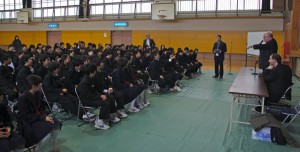 Today was absolutely one of the most memorable days I’ve had teaching in Japan!
Today was absolutely one of the most memorable days I’ve had teaching in Japan!
We were honored at Tanigawa Junior High School in Daito city, by a visit from Patrick Linehan, the Osaka/Kobe United States Consulate General, along with Greg Kay, the Public Affairs Officer, and Public Affairs Office staff member Eri Nakanishi. When they arrived, we had a short talk with my Prinicipal, Masataka Kugimiya about the US State Department’s support for English education. Afterward, they sat in on my 7th grade students’ classroom and gave a demonstration class for just over 30 minutes.
Since it was a short class, we decided to highlight some of the fun things we’ve been doing, including “buzzer” game-show-style games, iPad activities for telling time and reading, as well as phonics practice and quizzes.
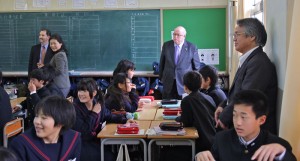 After our demonstration lesson, we moved to the gymnasium where all 150+ 7th-grade students and teachers were waiting. Mr. Linehan gave us a meaningful speech highlighting his background, explaining how he arrived at his current position with the State Department, and the importance of U.S./Japanese relations.
After our demonstration lesson, we moved to the gymnasium where all 150+ 7th-grade students and teachers were waiting. Mr. Linehan gave us a meaningful speech highlighting his background, explaining how he arrived at his current position with the State Department, and the importance of U.S./Japanese relations.
Mr. Linehan also had a special message regarding their English language education, which was highlighted by three main points.
1. Speak
2. Make Mistakes
3. Go!
His first point was that it is impossible to learn a foreign language without speaking it. I couldn’t agree more, and feel that speaking and verbal communication is severely lacking in Japanese schools’ English education classes. He urged the students to have fun, and speak to me as well as each other in a different language so that they could practice and enjoy a “living” foreign language.
The second point that he told my students is one that I couldn’t agree with more, based on my time and experience in Japan. The idea is that we learn more than we ever imagined about our own country and culture by experiencing someone else’s.
Finally, he focused on the importance of “making mistakes”, explaining that you can’t learn without doing so. He even said that making mistakes was part of the fun! To highlight that point, he told us a personal story he had of learning Japanese and telling a shocked Japanese language teacher that he “drank” the newspaper that morning! (The words “drink” and “read” are similar in Japanese). Finally he explained that students should make a point in their lives to go places. He encouraged them to travel and have as many foreign experiences as they could. He said that living in and travelling in foreign countries not only helps one to learn language, but to learn more about life and the world we all share.
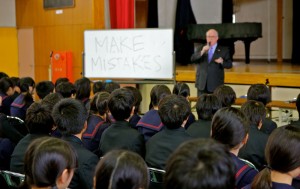 Following Mr. Linehan’s message, my students asked continual questions of the Consulate Officials, who gave the students Japanese-American flag lapel pins. I was really proud and surprised at the depth of many of their questions. My 12 and 13-year-old students were really mature, and asked questions that required a lot of thought and reflection. Some asked about American military bases in Okinawa, Mr. Linehan’s thoughts on the orderly structure of Japanese society, and even what he thought of the constant turnover of Japan’s prime ministers.
Following Mr. Linehan’s message, my students asked continual questions of the Consulate Officials, who gave the students Japanese-American flag lapel pins. I was really proud and surprised at the depth of many of their questions. My 12 and 13-year-old students were really mature, and asked questions that required a lot of thought and reflection. Some asked about American military bases in Okinawa, Mr. Linehan’s thoughts on the orderly structure of Japanese society, and even what he thought of the constant turnover of Japan’s prime ministers.
Afterwards, Mr. Linehan visited the Prinicipal’s office, where he gave everyone presents and even left gifts for the students who hadn’t been lucky enough to get pins in the assembly! As they boarded the Consulate vehicle to depart, the kids all ran up to them with sincere “thank you’s”
It was an amazing experience for me, and if it was even a fraction as good for these people that I treasure in my Japanese community, this was a major success. I cannot thank Patrick, Greg, and Eri enough for this experience, and hope that I can someday return the favor as a way of repaying them.
For more pictures of this amazing day, visit the gallery page here.
 今日は、日本で教育の場に立って以来、本当に一番の思い出深い一日となりました!
今日は、日本で教育の場に立って以来、本当に一番の思い出深い一日となりました!
我々、谷川中学校は、大変名誉なことに、在大阪・神戸アメリカ総領事館のパトリック・リネハン総領事をお迎えすることができ、国務省のグレッグ・ケイ氏と国務省広報・企画課の中西えり氏も共にお迎えすることができました。彼らか本校に到着した後、本校の釘宮正孝校長と、アメリカ国務省の英語教育支援について少しだけお話する時間がありました。その後、彼らは、私の中学校一年生の教室をご参観され、30分以上も模範授業を行って下さりました。
授業が短かったこともあり、私たちは、普段から行っている楽しいショースタイルのブザーゲームや、iPadを使った、時間の伝え方や読み方、そしてフォニックスの練習やパズルなどのアクティビティーも取り入れることにしました。
 模範授業の後、我々は、150人以上の一年生と先生たちが待つ、体育館へと移動しました。リネハン総領事は、彼の背景について、またどのようにしてアメリカ国務省の現在の役職にお付きになられたか、そして日米関係の重要性についてなど、とても意味のあるスピーチをして下さりました。
模範授業の後、我々は、150人以上の一年生と先生たちが待つ、体育館へと移動しました。リネハン総領事は、彼の背景について、またどのようにしてアメリカ国務省の現在の役職にお付きになられたか、そして日米関係の重要性についてなど、とても意味のあるスピーチをして下さりました。
そして、英語教育についての特別なメッセージも送られました。その3つのメインポイントは下記の通りです。
1.話そう
2.行こう
3.間違えよう
というものでした。
彼の初めのポイントは、話す以外に外国語を学ぶことは不可能だということ。全くその通りだと思います。そして日本の学校の教育の場では、発音することや、会話をするという部分に対して、本当に欠けていると思います。総領事は、生徒たちに“楽しむこと”を協調し、私に対してもお互いが他言語で話すのと同じように話すことで、“生きた”外国語を楽しむ練習になるということも話されていました。
総領事からの生徒たちへの2つ目のポイントは、日本での経験と時間から、 私も一番賛成するポイントです。その意図としては、多文化を経験することにより、自分の国や文化についても想像できないほどにたくさんのことを学ぶことができるのです。
最後に、総領事は、「間違えよう」というポイントについての重要性に焦点を当て、実行するまで何も学ぶことはできないことを説明されました。そして、間違えることも楽しいということを言われました。そのポイントの重点を説明するため、自身の日本語学習についてや、総領事が、その朝、新聞の飲まれたと(「のむ」と「よむ」の日本語の発音が似ているので)日本語先生を驚かせた経験なども話しておられました。
最後に、総領事は、生徒たちに、人生の中で、色々な所へ訪れるために主張をしていこうと語られていました。そして、生徒たちに海外に出て行き、たくさん経験をつむことを勧められていました。総領事は、海外に住むことや、旅行をすることは、言語を学ぶことだけに繋がるのではなく、我々が共有する世界やその暮らしについて学ぶことができると言われれていました。
 リネハン総領事のメッセージに対して、繰り返し総領事館について質問していた私の生徒は、日米のピンバッジを貰っていました。私は、彼らのするたくさんの奥深い質問にとても驚き、また誇らしく思いました。私の12〜13歳の生徒たちは、とても大人で、よく頭で考えなければならないような質問もなげかけていました。何人かは、沖縄の米軍基地について質問し、さらに頻りに任務交代を繰り返す日本の総理大臣についてなどの質問もしているものもいました。
リネハン総領事のメッセージに対して、繰り返し総領事館について質問していた私の生徒は、日米のピンバッジを貰っていました。私は、彼らのするたくさんの奥深い質問にとても驚き、また誇らしく思いました。私の12〜13歳の生徒たちは、とても大人で、よく頭で考えなければならないような質問もなげかけていました。何人かは、沖縄の米軍基地について質問し、さらに頻りに任務交代を繰り返す日本の総理大臣についてなどの質問もしているものもいました。
その後、リネハン総領事は、校長室を訪れ、我々にプレゼントを下さり、集会のときに、ピンバッチを受け取ることが出来なかった残念な生徒たちのためにも、ギフトを置いていかれました。出発の際、彼らがご乗車されたと同時に、子供達はみんな「Thank you」の言葉をおくろうと、走っていきました。
これは、私にとって本当に素晴らしい経験で、たとえそれが、私の宝である日本のコミュニティーにとって、ほんの少しの喜びであったとしても、大成功であったと思います。パトリック、グレッグ、そしてえりには、この経験が出来た感謝をしてもしきれません。そして、彼らに対して、いつか恩返しをしたいと思っています。
写真をもと見る。
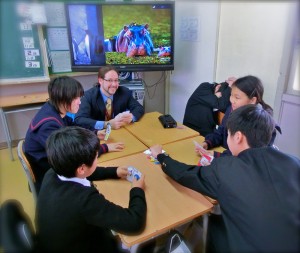 As foreigners, whether you live in rural Japan or in its busiest cities, we are still by far a small minority. The Japanese government ministries set out, decades ago, to find a way to expose more of its citizens to foreign culture and different ways of thinking. What developed after years of planning and experimenting was the JET Programme.
As foreigners, whether you live in rural Japan or in its busiest cities, we are still by far a small minority. The Japanese government ministries set out, decades ago, to find a way to expose more of its citizens to foreign culture and different ways of thinking. What developed after years of planning and experimenting was the JET Programme.

 Follow
Follow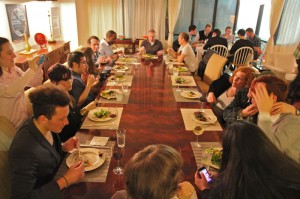
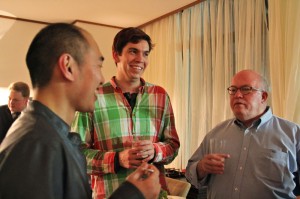
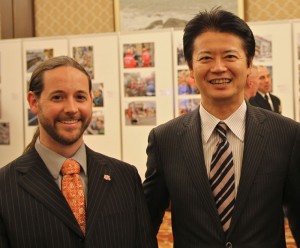
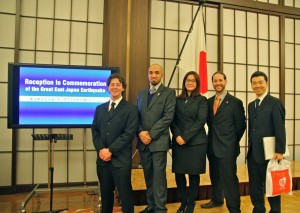

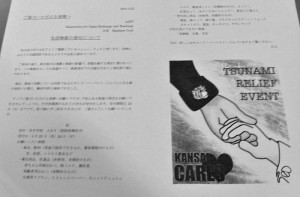
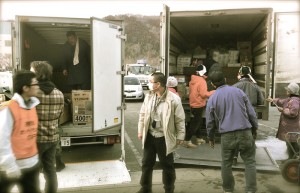




 Connect with me on LinkedIn
Connect with me on LinkedIn Follow me on Twitter
Follow me on Twitter Like me on Facebook
Like me on Facebook Read my RSS Feed
Read my RSS Feed